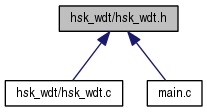|
hsk_libs-dev
163:b63ae088cc97
High Speed Karlsruhe XC878 library collection
|
|
hsk_libs-dev
163:b63ae088cc97
High Speed Karlsruhe XC878 library collection
|
HSK Watchdog Timer headers. More...

Go to the source code of this file.
Functions | |
| void | hsk_wdt_init (const uword window) |
| Sets up the watchdog timer. More... | |
| void | hsk_wdt_enable (void) |
| Activates the Watchdog Timer. More... | |
| void | hsk_wdt_disable (void) |
| Disables the Watchdog Timer. More... | |
| void | hsk_wdt_service (void) |
| Resets the watchdog timer. More... | |
HSK Watchdog Timer headers.
Provides access to the Watchdog Timer (WDT) of the XC878.
Depending on the configured window time the µC reset is delayed for 1.024ms (window < 5460µs) or 65.536ms (window >= 5460µs).
This time can be used by assigning a callback function to hsk_isr14 member hsk_isr14_callback::NMIWDT and setting the NMICON.NMIWDT bit.
The WDT has proven a useful tool in hazardous EMI conditions. Severe EMI may freeze the µC without causing a proper reboot. In most cases the WDT can mitigate this issue by reactivating the system.
However the WDT is trigger happy. A series of refresh time interval measurements shows that the WDT resets the µC long before the end of its interval shortly after boot. The best mitigation is to refresh the WDT with the hsk_wdt_service() function unconditionally. Instead of using fixed timings (e.g. for 20ms watchdog time a 5ms refresh interval should have been quite safe).
That however does not solve the problem with NMIs. Any non-maskable interrupt may cause the WDT to reset the µC. This means it is incopatible to the hsk_flash library, which requires precise timings with only a couple of µs tolerance. To meet this requirement the library uses the Flash Timer of the XC878, which triggers NMIs.
| void hsk_wdt_disable | ( | void | ) |
Disables the Watchdog Timer.
| void hsk_wdt_enable | ( | void | ) |
Activates the Watchdog Timer.
| void hsk_wdt_init | ( | const uword | window | ) |
Sets up the watchdog timer.
The window time specifies the time available to call hsk_wdt_service() before a reset is triggered. Possible times range from 21.3µs to 350ms.
The window time is rounded up to the next higher possible value. Exceeding the value range causes an overflow that results in shorter window times.
| window | The time window in multiples of 10µs |
The WDT runs at PCLK/2 or PCLK/128, i.e. the WDT low byte WDTL overlow occurs either every 21.333µs or every 1365.333ms.
One time unit (10µs) equals 120 PCLK/2 clock ticks. One PCLK/128 time unit (640µs) equals 120 PCLK/128 clock ticks.
| void hsk_wdt_service | ( | void | ) |
Resets the watchdog timer.
This function needs to be called to prevent the WDT from resetting the device.